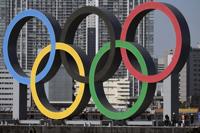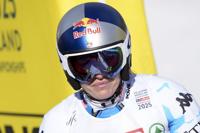The rather genteel world of curling can sometimes be jolted by the odd swear word that makes it on bonspiel broadcasts via player microphones.Â
It's something that The Curling Group CEO Nic Sulsky says comes with the territory of elite competition.
"I don't promote it, but at the same time, sports are fun and sports are emotional," he said. "It's 2025."
The subject of potty-mouthed athletes has been a talking point of late in Formula One circles. Under new rules, drivers could be suspended or lose championship points for swearing or making political statements.Â
The measures, published by the governing body FIA, apply to misconduct, which has a wide definition that includes offensive language.Â
The subject of swearing in the Roaring Game — one of the few sports where athletes are mic'd — was renewed when Sulsky posted a link on X, the website formerly known as Twitter, to a story that detailed the F1 developments.Â
"I'd like to alleviate the concern of players in @grandslamcurl that @thecurlinggroup has NO intention of banning swearing," Sulsky said in the post, which included curling stone, middle finger and laughing face emojis.
Team Mike McEwen vice Colton Flasch, a regular on the Grand Slam circuit that's owned by The Curling Group, was quick to reply.
"LFG!!!!!," Flasch posted.Â
Mic'd-up curlers provide viewers with unparalleled insight into the game, strategy and thought processes. But since broadcasts are live, curse words can make it to air at events like the Grand Slams or national and world championships.
"Sports, especially competitive sports, are high stakes. People have lots of investment of time and self-worth in the outcome of those events," said Ben Bergen, the author of "What the F: What Swearing Reveals About Our Language, Our Brains, and Ourselves."Â
"Those sorts of highly emotional situations are exactly the types of places that we tend to see people feeling the most prone to swear."
However, for a generally staid curling audience that skews heavily on the older side — some spectators bring their knitting to the arena — a cuss word can be as jarring as a big-weight takeout.
"I will never be angry with a curler who happens to drop an F-bomb or (swears) if they personally screw up," Sulsky said from Toronto. "Like, if it's about them, that's where most of the swearing goes down. If a curler wants to look at a curler and say something derogatory or a swear word in their direction, which is clearly different intent, that's a different story altogether.Â
"I'm not cool with that. At the end of the day, we have young kids watching. But it's also 2025."
Sportsnet is the host broadcaster for the five-stop Grand Slam series. Curling Canada's top events, like the upcoming Scotties Tournament of Hearts and Montana's Brier, are shown on TSN.
A Curling Canada spokesman confirmed curler fines have been issued during this quadrennial, without providing specifics. Team payouts at events are subject to deductions — believed to be somewhere in the $500 range — when necessary.Â
Organization CEO Nolan Thiessen said there's a section in competitor guides that outlines how athletes can be fined for conduct code violations like swearing.Â
"There is some leeway that our head officials give to the fact that we are wearing live mics playing a highly competitive sport on national television," Thiessen said. "We do understand that there are times where things happen.Â
"We talk to the athletes all the time there's people that don't like that. There's some people that do like it."
It wasn't immediately clear why broadcasters don't use a delay to ensure that unexpected occurrences — such as salty language — don't make it to air.Â
"When the stakes are very high or when the emotions are running strong, those are the situations when it's more socially licensed to swear," said Bergen, a professor of cognitive science at the University of California, San Diego.
"As a result, people might be filtering themselves a little bit less in those circumstances."
A Sportsnet spokesman said "there are no plans" to use a delay. A message left with TSN was not immediately returned.
"The biggest thing is the CRTC standards," Thiessen said in a recent interview in Calgary. "That's the thing we don't want to get in trouble with. If you are getting fines from them or you start getting pulled from television, then we've got a lot of people to answer to."
Sulsky said he has not had conversations with the Sportsnet production team regarding athlete swearing.Â
"No one is promoting the use of curse words," he said. "I just think this is a unique scenario where all the athletes are mic'd and these are humans in 2025."
This report by ºÚÁϳԹÏÍø was first published Feb. 6, 2025.Â
With files from ºÚÁϳԹÏÍø Press sports reporter Donna Spencer in Calgary.







































